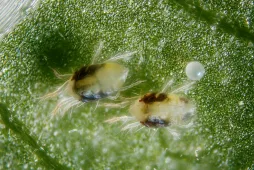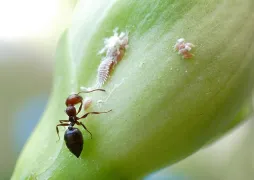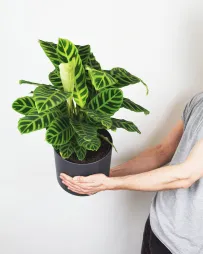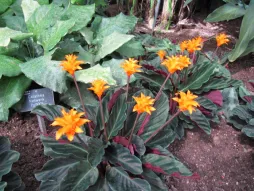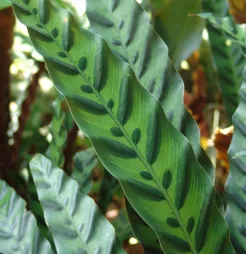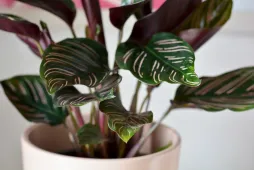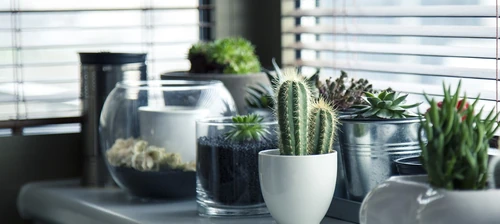Goeppertia makoyana, the peacock-feathered plant
Goeppertia makoyana grows in the tropical forests of eastern Brazil. This rhizomatous member of the Marantaceae family has become a highly prized houseplant thanks to its luxuriant foliage.
How to recognize the Goeppertia makoyana?
Goeppertia makoyana, nicknamed the peacock plant, is a herbaceous plant with a dense, bushy habit. In the wild, some specimens can reach two meters in height. In our latitudes, it grows slowly. Only two or three new leaves appear each year.
Oval, they are shaped like peacock feathers. They are also patterned. Each bright, light-green leaf blade is streaked with black spots along the veins. On the reverse side, the patterns disappear and the green gives way to a brilliant purple.
With foliage like this, the peacock plant doesn't need to flower to attract attention. Yet in its native habitat, in June, it is adorned with small white tubular flowers.
Sometimes called a cathedral window plant because of the patterns decorating its limbs, Goeppertia makoyana is also a praying plant, like goeppertia ornata or goeppertia rufibarba. Every evening, it folds its leaves in pairs to protect them from nocturnal predators. When the sun rises, it unfolds them again.
Our maintenance tips
Not very demanding, your Goeppertia makoyana is content with a location without direct sunlight and plenty of humidity.
Watering
Goeppertia makoyana likes to keep its soil moist, but not soggy. Water when the potting soil has dried on the surface, over a centimetre.
Use room-temperature, low-limestone water. You can use rainwater, for example.
After watering, remove any excess water stagnating in the dish or planter. Goeppertia makoyana hates having its roots immersed in water.
Spray
Spray foliage with non-calcareous water at room temperature. Fogging helps improve humidity, clean leaves and control pests.
Repotting
Every spring, repot your Goeppertia makoyana to give it more space.
Obtain a pierced pot of a larger size than the previous one. Don't hesitate to choose a ceramic or plastic model. These materials retain moisture and allow you to space out watering. Your Calathea makoyana also prefers a wide pot to a deep container to give it room to grow.
Line the bottom with gravel or clay balls for drainage. Then pour in potting soil for green plants. You can lighten it by adding perlite.
Plant your subject in the middle and fill in with substrate. Water for the first time to eliminate air bubbles and encourage rooting.
Fertilization
To promote the growth of your Goeppertia makoyana, apply fertilizer in spring and summer.
Apply a liquid fertilizer for green plants to stimulate growth.
Cleaning
Dust sometimes accumulates on the leaves of your Calathea makoyana and interferes with photosynthesis.
You can gently clean the foliage with a sponge or a clean, wet cloth.
If your plant looks dirty, you can add some black soap to the water.
You can gently clean the foliage with a sponge or a clean, wet cloth.
If your plant looks dirty, you can add some black soap to the water.
Prune
Cut back dry stems and wilted leaves. You can use a pair of scissors or pruning shears. Remember to clean them beforehand to prevent the spread of disease.
Cutting
Cutting is carried out during the strong growth phase, generally in spring and early summer.
Take advantage of repotting to divide your Calathea makoyana. Once your plant has been dug up, locate a rhizome with one or more stems. Each stem should have at least three leaves.
Using your hands or a clean, sharp tool, separate the rhizome from the rest of the plant.
Pour a drainage layer (gravel, clay balls, pozzolan, etc.) of one to two centimeters into a bucket or small pierced pot. Add a draining substrate, such as universal potting soil mixed with sand.
Make a pilot hole and plant the cutting. Do not bury the leaves. Press lightly and water.
Diseases / Threats
Information
| Family | Marantaceae - Marantaceae |
| Type | Goeppertia - Goeppertia |
| Species | Goeppertia makoyana - Goeppertia makoyana |
| Lifecycle | Perennial |
| Foliage | Evergreen |
| Exposures | |
| Substrat | |
| Planting method |
In pots |
| Categories | |
| Tag |
Soiffarde |
| Origin |
South America |
| Hardiness (USDA) | 12a |
| Leaf color |
|
| Flower color |
|
Discover plants from the same family













